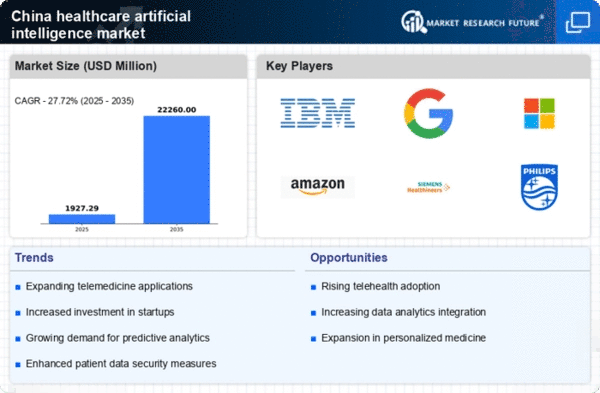Growing Aging Population
China's rapidly aging population is a critical driver of the healthcare artificial-intelligence market. With over 250 million individuals aged 60 and above, the demand for efficient healthcare solutions is escalating. AI technologies are being utilized to address the unique healthcare needs of the elderly, including chronic disease management and remote monitoring. The integration of AI in elder care is projected to reduce hospital readmission rates by up to 20%, thereby alleviating pressure on healthcare systems. This demographic shift is expected to propel the market forward, as healthcare providers increasingly adopt AI solutions to enhance service delivery for older adults.
Government Initiatives and Support
The Chinese government is actively promoting the integration of artificial intelligence in healthcare, which significantly impacts the healthcare artificial-intelligence market. Initiatives such as the Healthy China 2030 plan aim to leverage AI technologies to improve healthcare delivery and accessibility. Financial support and incentives for AI research and development are being provided, fostering innovation within the sector. The government's commitment to enhancing healthcare infrastructure is expected to result in an investment of over $10 billion in AI healthcare solutions by 2027. This supportive environment is likely to accelerate the adoption of AI technologies across various healthcare applications, thereby driving market growth.
Rising Demand for Personalized Medicine
The healthcare artificial intelligence market in China is experiencing a notable surge in demand for personalized medicine. This trend is driven by the increasing recognition of the need for tailored treatment plans that cater to individual patient profiles. AI technologies facilitate the analysis of vast datasets, enabling healthcare providers to develop customized therapies based on genetic, environmental, and lifestyle factors. As a result, the market is projected to grow at a compound annual growth rate (CAGR) of approximately 30% over the next five years. This growth is indicative of a broader shift towards precision medicine, where AI plays a crucial role in enhancing patient outcomes and optimizing treatment efficacy.
Increased Focus on Healthcare Efficiency
The healthcare artificial-intelligence market in China is significantly influenced by the growing emphasis on healthcare efficiency. As the demand for healthcare services rises, there is a pressing need to optimize resource allocation and streamline operations. AI technologies are being deployed to automate administrative tasks, improve patient flow, and enhance clinical decision-making processes. Studies indicate that AI implementation can lead to a reduction in operational costs by approximately 15%, allowing healthcare facilities to allocate resources more effectively. This focus on efficiency is likely to drive the adoption of AI solutions, contributing to the overall growth of the market.
Advancements in AI Algorithms and Technologies
Continuous advancements in AI algorithms and technologies are reshaping the healthcare artificial-intelligence market in China. Innovations in machine learning, natural language processing, and computer vision are enabling more accurate diagnostics and efficient patient management systems. For instance, AI-driven diagnostic tools are now capable of analyzing medical images with an accuracy rate exceeding 90%, which is a significant improvement over traditional methods. These technological advancements not only enhance the quality of care but also reduce operational costs for healthcare providers. As a result, the market is likely to witness a robust growth trajectory, with an expected valuation of $5 billion by 2026.
















